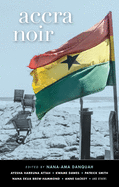
"Accra is the perfect setting for noir fiction," writes Nana-Ama Danquah (Willow Weep for Me), Ghanaian American editor of this volume for Akashic Book's long-running Noir series. Hardly an endorsement for tourism, this spine-chilling 13-story collection offers an opportunity to "consider the context, beware of a pretext, search for a subtext" on living--and dying--in a major metropolis consumed by poverty and desperation.
Overlooked, underrepresented citizens exact their own due process in the opening and closing stories: the desperate literally feed the desperate in "Chop Money," and a woman punishes her ex-pat boyfriend--and his wife and children--in "Instant Justice." The powerful (mis)use their privilege in "Moon over Aburi," which reveals a policewoman who castrated a rapist, and "Tabilo Wuɔfɔ," in which a PTSD-addled former soldier commits horrific violence. Corpses divulge their own murders in "Shape-Shifters" and "The Boy Who Wasn't There." Infidelity turns fatal as a woman listens to one lover kill another in "Fantasia in Fans and Flat Screens"; a philanderer inspires poisonous revenge in "Intentional Consequences"; a suspicious husband kills in "When a Man Loves a Woman." "Trust No One" surely could be subtitles for "The Driver" who victimizes a pair of twins; "The Labadi Sunshine Bar," where youth usurps experience; "Kweku's House," in which the elderly suffer; and "The Situation," in which best friends lose all to a shared lover.
"Much like Accra, these stories are not always what they seem," Danquah warns. Interestingly, her literary roster includes an Irish ex-pat and a Parisian journalist. While an overwhelming bleak impression of Accra looms, the Ghanaian capital's inhabitants haunt long after the final page. --Terry Hong, Smithsonian BookDragon

